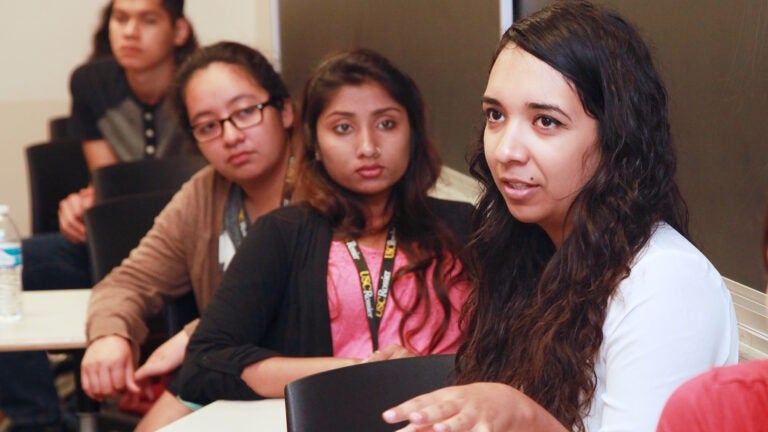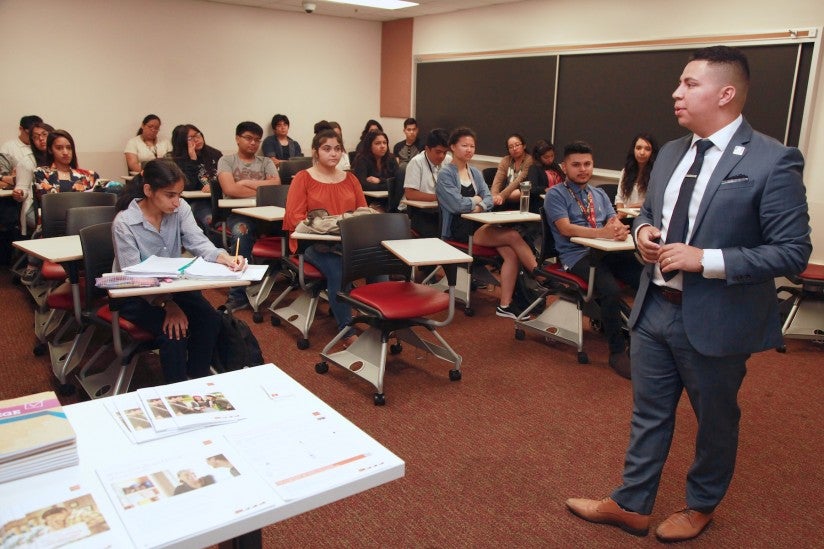
Instructor Christine Rocha, right, speaks during a class while high school students Tritrina Roy, center, and Elizabeth Acevedo look on. (Photo/Margaret Molloy)
‘College knowledge’ helps students prep for higher education
USC Rossier’s long-running SummerTIME program focuses on tools, information, motivation and education needed by aspiring college applicants
For the 80 high schoolers and rising college sophomores in this year’s SummerTIME program, writing was anything but rote.
“This was the first paper I’ve had to write that was not just on internet-based research,” said Breyen Taboada, who is entering his senior year at John C. Fremont High School.
“The program definitely helped prepare me for college by improving my writing,” said Oscar Muñoz, who will be a freshman at the University of California, San Diego this fall. “I’ve never written so many drafts before.”
Now in its 15th year, SummerTIME — short for tools, information, motivation and education — has helped hundreds of aspiring college applicants from low-income backgrounds by teaching intensive research and writing skills, as well as “college knowledge” aimed at easing their transition to university learning and living. The program is part of the Pullias Center for Higher Education’s Increasing Access via Mentoring (I AM) initiative at the USC Rossier School of Education.
Gaining confidence
Each weekday for a month, students traveled to the University Park Campus for three hours of writing instruction emphasizing the thesis building, research, writing and editing skills essential for producing an effective college-level paper. By July 15, when this year’s program concluded, all of the students had completed a full research paper and presentation on a topic of their choosing.
This program changed the way [students] approach working on a paper, and it gave them more confidence.
Chris Tsichlis
“Learning how to do scholarly research in the library — versus the Google searches they’re used to doing for papers in high school — was revolutionary to them,” said writing instructor Chris Tsichlis ’13, who earned his Master of Arts in Teaching (MAT) at USC Rossier. “This program changed the way they approach working on a paper, and it gave them more confidence.”
“The intensity of the writing component is what really differentiates SummerTIME from other college access programs,” said Stefani Relles, an assistant professor at University of Nevada, Las Vegas, who spent her sixth summer working with the program. This year, she is conducting an evaluation of the program.
Instilling college knowledge

In addition to three hours of writing every day, the students also took daily college knowledge courses on time management and other self-reliance skills, and received guidance on how to navigate the application and financial aid processes. As most SummerTIME students will be the first in their families to attend college, this information can be as crucial as how to write well. They also had the opportunity to hear about college firsthand from panels of current and recent college graduates.
Pullias Center co-director William Tierney — University Professor and the Wilbur-Kieffer Professor of Higher Education, who created and heads SummerTIME — said that, while much of the college knowledge imparted by the program may be commonly understood by “those of us who have siblings or parents who went to college,” it can by mysterious for youth who are first-generation college students.
Ensuring small cohorts
With six dedicated writing teachers and several academic advisers, the program provides another advantage not found in the students’ underfunded high schools: intimate class sizes of approximately 12 to 14 students each.
The research is pretty definitive that smaller class sizes improve learning.
Stefani Relles
“The research is pretty definitive that smaller class sizes improve learning,” Relles noted.
Writing teacher Iona Cano agreed. “The small groups allowed me to take a more individualized approach,” she said.
Cano’s group included students from the Kayne Scholars program who had just completed their freshman year in college. The Kayne Foundation recently selected USC Rossier’s SummerTIME program as one of just three partners to help fulfill its mission of fostering success throughout college and in launching careers.
In addition to helping each student identify his or her writing strengths and areas where growth was needed, Cano worked with her Kayne Scholars group on the biggest challenges they faced during their freshmen year — which ranged from homesickness to feelings of cultural alienation.
Expanding reach
In previous years, the SummerTIME program focused on high school seniors about to head off to college. This year, the program expanded to include rising college sophomores and added high school juniors entering their senior year.
Michelle Huerta, who will be a senior at Fremont High School this fall, said she appreciated how challenging the program was.
“Even though there were no grades, we were challenged to learn and grow,” she said. “And the teachers were awesome. In addition to teaching us a lot about how to do research, the program also helped us with how to find the right college as well as information on the application and financial aid process.”
Reaching these younger students is important, Tierney said, because in preparing for college, “you need to think so far in advance right now.”
In terms of his own advance planning, Tierney hopes to raise enough money to add mathematics to the SummerTIME curriculum.
Unlike many other college-preparatory programs aimed at underserved youth, SummerTIME’s location at a school of education means the program’s pedagogy is continually being refined based on feedback and outcomes to ensure its continued effectiveness. For example, students are tested both before and after the program to measure their progress. According to Tierney, the tests show that four weeks in SummerTIME can improve students’ writing abilities by about one grade level.
Beyond that, the supportive tactics are contributing toward the program’s ultimate objective: Over the years, SummerTIME participants have gained acceptance at institutions ranging from the California State University system to Dartmouth and Harvard, as well as Breyen Taboada’s first choice, USC.
According to Tierney, the program’s benchmark for success is getting students through freshman year of college, which exponentially increases their odds of graduating.
“More than 90 percent of them … have made it through the first year and are moving on,” he said.



